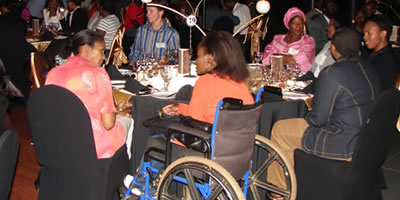Inclusion of pupils with intellectual disabilities: Primary school teachers’ attitudes and willingness in a rural area in Uganda
Inclusion of pupils with intellectual disabilities: Primary school teachers’ attitudes and willingness in a rural area in Uganda
Patrick Ojok, and Siri Wormnæsc∗
Department of Community and Disability Studies, Kyambogo University, Kampala, Uganda; Department of Disability and Human Development, University of Illinois, Chicago, USA; Department of Special Needs Education, Faculty of Education, University of Oslo, Oslo, Norway (Received 25 August 2011; final version received 3 September 2012)
Teachers in regular schools have a responsibility to accommodate the needs and interests of all learners. The attitudes and willingness of teachers to include learners with intellectual disabilities in their classes in regular schools in a district with a semi-nomadic pastoral population in north-eastern Uganda was investigated. A survey of 125 school teachers was conducted, using an attitude scale and a willingness sub-scale. The results showed slightly more positive than negative attitudes, and more willingness than unwillingness to teach learners with intellectual disabilities. Attendance of workshops and seminars had a positive impact on teacher attitudes and willingness towards inclusive education. The findings are discussed with reference to historical–cultural characteristics of the district, as well as pupil and teacher characteristics. Keywords: inclusive education; teachers; attitudes; willingness; intellectual disabilities; Uganda
Introduction Every child is entitled to quality basic education (UNESCO 1994). Inclusive education is a process in which schools, communities and governments strive to reduce barriers to participation in learning for all citizens (Booth and Ainscow 1998; UNESCO 2009). Teachers in ordinary schools have a responsibility to accommodate the needs and interests of all learners, including children with disabilities. The attitudes and willingness of primary school teachers to teach pupils with intellectual disabilities in regular schools is one of the factors that is critical to successful implementation of inclusive education (Avramidis and Kalyva 2007; Forlin, Douglas, and Hattie 1996; Hegarty 1996). Studies from several countries have shown that the attitudes of teachers towards inclusion of children with intellectual disabilities are less positive than their attitudes towards inclusion of children with other disabilities (de Boer, Pijl, and Minnaert 2011; Forlin 1995; Mushoriwa 1998; Scruggs and Mastropieri 1996; Soodak, Podell, and Lehman 1998). How children with disabilities are treated in inclusive schools is assumed to be affected by the extent to which teachers are willing to support them. Click Here to download



